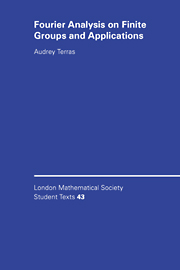Book contents
- Frontmatter
- Contents
- Preface
- Part I Finite Abelian Groups
- Part II Finite Nonabelian Groups
- 15 Fourier Transform and Representations of Finite Groups
- 16 Induced Representations
- 17 The Finite ax + b Group
- 18 The Heisenberg Group
- 19 Finite Symmetric Spaces–Finite Upper Half Plane Hq
- 20 Special Functions on Hq – K-Bessel and Spherical
- 21 The General Linear Group (Expression not displayed)
- 22 Selberg's Trace Formula and Isospectral Non-isomorphic Graphs
- 23 The Trace Formula on Finite Upper Half Planes
- 24 Trace Formula For a Tree and Ihara's Zeta Function
- References
- Index
19 - Finite Symmetric Spaces–Finite Upper Half Plane Hq
from Part II - Finite Nonabelian Groups
Published online by Cambridge University Press: 06 July 2010
- Frontmatter
- Contents
- Preface
- Part I Finite Abelian Groups
- Part II Finite Nonabelian Groups
- 15 Fourier Transform and Representations of Finite Groups
- 16 Induced Representations
- 17 The Finite ax + b Group
- 18 The Heisenberg Group
- 19 Finite Symmetric Spaces–Finite Upper Half Plane Hq
- 20 Special Functions on Hq – K-Bessel and Spherical
- 21 The General Linear Group (Expression not displayed)
- 22 Selberg's Trace Formula and Isospectral Non-isomorphic Graphs
- 23 The Trace Formula on Finite Upper Half Planes
- 24 Trace Formula For a Tree and Ihara's Zeta Function
- References
- Index
Summary
Analysis on Symmetric spaces, or more generally homogeneous spaces [G/K] of semisimple Lie groups, is a subject that has undergone a vigorous development in recent years, and has become a central part of contemporary mathematics. This is only to be expected, since homogeneous spaces and group representations arise naturally in diverse contexts ranging from Number Theory and Geometry to Particle Physics and Polymer Chemistry.
R. Gangolli and V.S. Varadarajan [1988, Preface]In this chapter we want to consider finite analogues of the symmetric spaces G/K mentioned above. These are related to the concept of Gelfand pair (G, K). See also Gelfand [1988], Helgason [1968, 1984], Selberg [1989], Terras [1985 and 1988], and Vilenkin [1968]. In particular, we will study a finite analogue of the Poincaré upper half plane H ≅ G/K, with G = SL(2, ℝ) and K = SO(2). We will replace ℝ with the finite field q. Such quotients have been considered by Angel et al. [1992], Celniker et al. [1993], Soto-Andrade [1987], and Terras [1991, 1996]. Other quotients G/B, for B the Borel subgroup of upper triangular matrices, have been considered by Krieg [1990] and Stanton [1990], for example.
One goal is to obtain a Fourier transform on K\G/K called the spherical transform (see Corollary 1 of Theorem 2 in Chapter 20 and formula (15) of Chapter 23). The spherical transform has many of the properties of the Fourier transform on abelian groups since it is complex valued rather than matrix valued.
- Type
- Chapter
- Information
- Fourier Analysis on Finite Groups and Applications , pp. 302 - 328Publisher: Cambridge University PressPrint publication year: 1999



